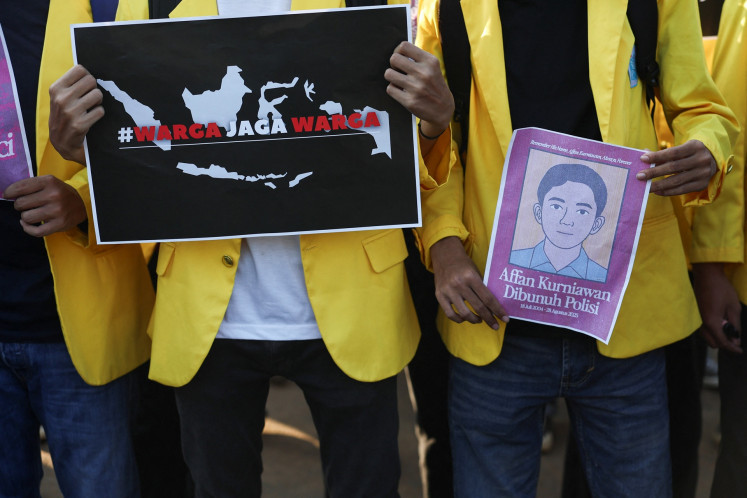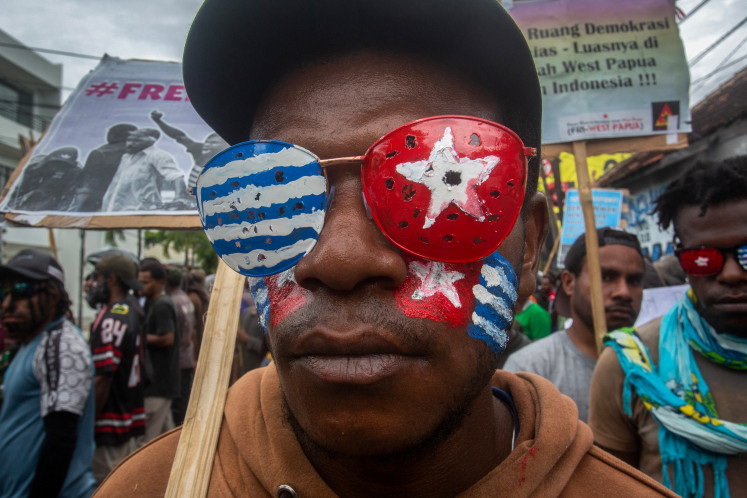Popular Reads
Top Results
Can't find what you're looking for?
View all search resultsPopular Reads
Top Results
Can't find what you're looking for?
View all search resultsEngaging Jams
There was hustle and bustle in the Northcote Uniting Hall in Melbourne, Australia, earlier this month
Change text size
Gift Premium Articles
to Anyone
T
here was hustle and bustle in the Northcote Uniting Hall in Melbourne, Australia, earlier this month. Dozens were active in the assembly of the ASYIK Culture Jam puzzle - a smorgasbord of music, dancing, food and cultural whatnot — which depicted Indonesian culture, the puzzle was completed in less than two hours.
In one corner, members of a gamelan group were assembling their instruments as others were trying to hang traditional Indonesian fabrics on the towering windows. On another side, another group was busy unpacking plastic containers of food. Despite the apparent chaos, preparations were complete as the day neared sundown.
The scent of sandalwood and chai complemented the cheerful nattering of people as they entered the romantically lit venue.
ASYIK Culture Jam is an amalgamation of the ASYIK Indonesian-Australian Arts Festival, which has been held four times before in Sydneyand the Culture Jam, which has been held a few times before by Polykala, a Melbourne based cultural organization.
“The concept of ASYIK is to bring together Indonesian Australian artists and artists who have a love for Indonesia — and anywhere connected to Indonesia. We want to try to create a collective that connects all local artists interested in Indonesian art. We found [especially in] Sydney that a lot of young emergent artists are creating new work,” Alfira O’Sullivan from Suara Indonesia Dance Group said.
Melbourne was chosen for the fourth ASYIK because it is seen as Australia’s cultural capital. In the future, Alfira hopes that similar collectives can be established in other cities such as Perth and Adelaide.
Ananth Gopal from Polykala said that the organization works with migrants by training them in drama, dance as well as various other art forms. Polykala can mean “very good” in Greek, but it can also mean “many cultures” when you use a mix of Latin and Sanskrit translations. Polykala’s work is relevant especially in light of Australia’s population dynamics.
According to the Australian Bureau of statistics, as of June 30, 2011, 27 percent of the estimated resident population was born overseas (6.0 million people) increasing from the 23.1 percent (4.5 million people) of 10 years earlier and from some 10 percent recorded in 1951.
“We don’t just work with migrants as a group but link people with different cultures and establish friendships and relationships,” Gopal said.
Gopal said that the attending crowd, was comprised of people of various descents including Indonesians, South Americans, Africans and Middle Easterners, was the most diverse so far in the history of Polykala culture jams.
A number of treats awaited the audience, regardless of their ethnicity. The entrance fee, of A$10 (US$15), gave them access to movies, music, dance and an exhibition of paintings.
The artists performed for free and most of the night’s proceeds were handed over to the African Street Theater (AST), which works with African/Australian communities.
ASYIK Culture Jam began with a Balinese gamelan performance. A number of dances followed, including Acehnese, Malay and the topeng (masked) dance — accompanied by a live performance of Cirebon-style gamelan music.
One session even involved O’Sullivan and her partner from Suara Indonesia, Murtala, teaching the audience how to do the Acehnese dance, which is done in the sitting position and involves plenty of movements of the hand and torso.
Of course, the food was another highlight of the evening, as dozens lined up to get their share of gado-gado (steamed vegetables in peanut sauce) and banana fritters.
Jeremy Dullard, whose group carried out the first gamelan performance that night, said that he formed a gamelan group, or “organization” as he puts it, to pass on his knowledge of Balinese music. He first encountered gamelan
in 2001.
According to Dullard, Australian artists can “absolutely learn more” from their Indonesian counterparts.
“There is quite a lot of beauty and genius to be learned from Indonesian culture. It is crazy. I learned Indonesian in high school but it wasn’t until I went to university that I found out about gamelan,” he said.
Lisa, one audience member, said it was the first time she came to such an event but would be open to attending other ones that centered around one of Australia’s closest neighbors.
When asked about the sort of information she would like to know about Indonesia, she said, “I am practical. So I would like to know more about the economy”.
One Culture Jam usually leads to another, Gopal said. Thus, the next Culture Jam will feature the
Somali culture. This also corresponds with the channeling of proceeds of the ASYIK Culture Jam to the AST.
The Somalian population in the state of Victoria, which is home to Melbourne, began to increase after civil war broke out in Somalia in 1991, the Museum Victoria website said.
Nadia Faragaab from the AST expressed her excitement for the upcoming Culture Jam. According to her, the Melbourne’s Somali community is doing the best they can to adjust to their new lives after being forced to leave their war-torn homeland.
Even thought they live in Australia they still hold hopes that they will, one day, go back to Somalia. This can, at times, make them reluctant to participate in social and cultural activities.
Despite some young Somali Australians being active in some forms of entertainment, “the community faces a lot of issues that are not discussed,” Faragaab said.
“The African Street Theatre aims to address the difficulties that are faced by everyday Somali Australians. Whether it is being stopped at the airport for a ‘random’ check or going for a job interview and pretty much getting the job until the employers finds out that you do not look how you sounded,” she said.
— Photos by JP/
Dina Indra Safitri










